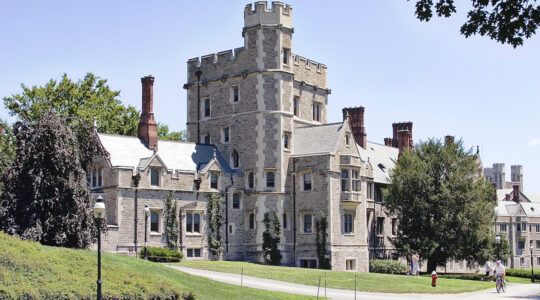WASHINGTON (JTA) – Trying to influence U.S. foreign policy with reports on Jerusalem’s alleged abuses against Palestinians, an Israeli human rights organization is opening an office on Capitol Hill.
B’Tselem, also known as the Israeli Center for Human Rights in the Occupied Territories, wants to hire two representatives for an office slated to open by January, according to Executive Director Jessica Montell.
The group is seeking to inject human rights into the Washington debate on the Israeli-Palestinian conflict, as well as educate American Jewry on such issues.
Several human rights groups and think tanks here already are emphasizing what they describe as the discriminatory treatment of Palestinians in the West Bank. Aside from the occasional reference by a sympathetic lawmaker, however, such allegations generally are ignored in Congress. Lawmakers typically view the problem as Israel needing to safeguard its security while also satisfying Palestinian national aspirations.
Members of Congress have proven less likely to ignore criticism of Israel when it comes from Jewish and Israeli sources. Still, left-leaning Jewish groups on Capitol Hill, including Americans for Peace Now, mostly avoid the issue of alleged rights violations. They prefer to focus on convincing lawmakers that Israeli and American security interests are best served by a two-state solution.
“B’Tselem is quite distinct because we only address human rights issues, not politics,” Montell told JTA.
Montell said the organization is hoping to generate discussion on such matters, trying to ensure that “relevant information gets into the right hands.”
“We need to discuss what is justified in the name of security,” she said. “Are there any red lines? What kind of Israel do we want?”
B’Tselem chronicles the detention of Palestinians without trial, allegations of abuse and the effect of Israeli policies on day-to-day Palestinian life. Recent emphasis has been on difficulties caused by Israeli roadblocks and the separation barrier in the West Bank.
The major international human rights groups, which focus on an array of issues, are welcoming the arrival of B’Tselem.
Joe Stork, deputy Middle East director for Human Rights Watch, called B’Tselem’s work “first rate” and described the organization as “probably the pre-eminent human rights group in Israel right now.”
Marty Rosenbluth, Amnesty International USA’s country specialist for Israel, echoed Stork’s sentiment.
“The debate is around security – as it should be – but none of the discussion here is about human rights,” Rosenbluth said. “I’m hoping that by opening an office here, B’Tselem can put forward the human rights issues.
“It isn’t just a question of talking about bad things that Israelis do to Palestinians,” he said, “but bad things Palestinians do to Israelis.”
While B’Tselem has condemned attacks on Israeli civilians, it has been accused by some Jewish groups of displaying a pro-Palestinian bias.
NGO Monitor, which describes itself as promoting “critical debate and accountability of human rights non-governmental organizations in the Arab-Israeli conflict,” says groups like B’Tselem often ignore the context of Palestinian terrorism in describing restrictions faced by Palestinians and place too much credence in Palestinian reports.
In a statement on its Web site, NGO Monitor raised concerns about a B’Tselem office in Washington, but also said the organization has been “somewhat less biased” than other NGOs, “and took the lead in condemning Palestinian attacks from Gaza and other violations of Israeli human rights. This NGO was also the first to call for the release of the kidnapped Israeli soldiers, noting that the holding of hostages is a ”war crime,’ and the denial of access by the International Red Cross is ‘a blatant violation of international law.’ “
Montell said B’Tselem has been in touch with the American Jewish and human rights communities, but currently has no plans for collaborative efforts.
“Everyone who cares about Israel needs to confront its less attractive side,” she said. “The goal is not to ignore the unflattering parts of Israel but work to change them.”
JTA has documented Jewish history in real-time for over a century. Keep our journalism strong by joining us in supporting independent, award-winning reporting.





